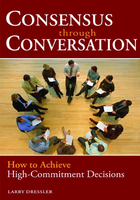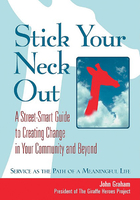Are We There Yet
NO DOUBT ABOUT IT Social networks have landed in our culture, and they're planning to stay a while.
During late 2008 and early 2009, Facebook doubled in size, growing from 100 million registered users to 200 million in eight months,[1] and then added another 150 million users by early 2010.[2] Twitter's popularity skyrocketed during most of 2009, jumping from 4.5 million visitors to more than 20 million.[3]
And yet, for all those impressive numbers, and for all the horn-tootin' that happens about the disruptive and democratizing potential of the Internet, we're still seeing the Big Important Conversations being dominated by the same old, same old.[4] Despite the fact that women, for example, make up over half of the active users on most social networking sites,[5] we still usually see men served up as the expert voices on social networks, on blogs, and in mainstream media. Or, even though African-Americans who are online are more likely to be users of Twitter than white people who are online,[6] white people are given the role of experts for speaking at conferences, on top 10 lists, and more. In 2009, for example, Europe's top web conference, LeWeb, had mind-bogglingly few speakers who were women (just 5%) or people of color (under 10%).[7] We're asked to listen to the same voices that got us to where we are today, socially and culturally; and often when there's homogeneity in the experts' background, there's also a lack of ideological diversity. Structural, societal forces that keep diverse voices separate from one another are pressing down on us as participants and reinforcing existing hierarchies. If the Internet is so revolutionary, why are we still stuck with more of the same
Why the Aggregation of Influence Is a Bad Thing
Money, influence, and access congregate around those who do the talking. The same folks get the attention—and thus the resources—to put forth ideas and issues. Clay Shirky, author and faculty member at the Interactive Telecommunications Program at New York University, examined what's known as "the power law" back in 2003.[8] According to the power law, the more well-known something becomes, the more exponentially its popularity increases. For example, you don't get twice as popular when two people like you; you actually get at least four times more popular, thanks to those two people's combined influence.
Looking at the number of incoming links to a variety of blogs (433 in total), Shirky found that just two blogs held a full 5% of all inbound links. And blogs aren't the only place online where he found power law distributions. Therefore, the Internet is serving to replicate age-old patterns of influence and power.
Creating a just society is sort of like the evolution of a species. If you have a bunch of the same DNA mixing together, the species mutates poorly and eventually dies off. But bring in variety—new strains of DNA—and you create a stronger species. It's no different in idea generation. You get a bunch of the same people talking to each other and making the rules for a few millennia, and eventually you're going to end up with a lack of meaningful advancement.
It's time to bring fresh life into the conversations that we're having about social change, and social networks are our strongest bets for doing so. A November 2009 Pew Internet & American Life study showed, for example, that people who use a social networking service have networks that are about 20% more diverse than people who don't use the Internet at all.[9] By being connected to different types of people with whom we share our stories, we're setting the stage for a fundamental shift in how we make change.
I think we can change the traditional power dynamics. In fact, I think you will change the traditional power dynamics.
A tremendous amount of potential for Internet culture exists, but it's just now being realized. I hear what you're saying "I remember 1995, too! That's when everyone said the Internet was this big democracy, and the whole ‘No one knows you're a dog online' stuff. But that didn't happen, did it"
No, not yet.
As Karen Carpenter once sang, "We've only just begun."
A Brief State of the Internet Union
Before we tackle the "how" end of the question, let's have a look at the cultural and ideological ecosphere known as the Internet as it stands now
? Although broadband access at home is growing every year, minorities still lag behind. For example, while 63% of all American homes now have broadband Internet service, only 46% of African-American homes do.[10]
? Half of the 20% of Americans who have dial-up connections or don't go on the Internet at all say that it's not relevant to their lives.[11]
? Only 18% to 20% of adults making less than $40,000 a year took some kind of political action online between August 2007 and August 2008, compared with 45% of people making $100,000 a year.[12]
? Of young adults who are online and actively participating in creating content, 64% of men have shared content that they created online, while only 50% of women have.[13]
? Wikipedia says its contributors—that is, people who are editing our history—are "more than 80 percent male, more than 65 percent single, more than 85 percent without children, around 70 percent under the age of 30."[14]
Does diversity even matter when it comes to technology and who's active online We've come this far and gotten some pretty cool stuff out of the deal, so do we need to be all that concerned
Well, yes. The ideas that we come up with through sharing and connecting on social networks—especially those that tackle the tough issues of social change—fundamentally require participation from lots of people with different experiences and identities in order to succeed. We're not talking about making sure you have a person of color in your friends list, or even that your organization's constituency has the demographically sound representative number of women. Diversity in the social network sphere is critical for generating fresh perspectives on old problems, to help us avoid replicating on the Internet what we've done for hundreds of years—marginalizing or otherwise ignoring voices that can share ideas for systemic change.
In the old way, gatekeepers had the most influence on things like news and policy. Gatekeepers have traditionally been made up of classes of people[15] who didn't typically question the social, economic, or political status quo.[16] It's a status quo that's brought us an unemployment rate that is always much higher for people of color than for white people (and that gap is widening),[17] 7,783 reported incidents of hate crimes in the United States in 2008,[18] the rates of violence against women skyrocketing in recent years,[19] the fact that LGBT youth are four times more likely to attempt suicide than straight youth (not to mention that 30% to 50% of all transgender people have attempted suicide),[20] and the largest gap between rich and poor since the Great Depression.[21] Up till now, we've clearly been living out a definition of insanity often attributed to either Einstein or Ben Franklin doing the same things over and over and expecting different results. Remember that DNA theory I mentioned in the last section A bunch of the same material has been mixing around the save-the-world gene pool, and the possibilities for innovation are exhausted. In 2007, for example, the website kottke.org surveyed the most prominent tech conferences in 2006 and 2007 in search of female speakers.[22] The numbers were dismal The highest percentage, outside of a tech conference specifically for women, was 30%, and most hovered in the 10% to 15% range. We've got to infuse new ideas into the mix.
When addressing inequality, too often we look at, and for, the voices of authorized experts to establish what needs to be done. More often than not, those experts come out of a tiny demographic not representative of who is affected most by the injustices we're working on. Technology-related policy wonks and thought leaders are especially white and male, even though women and people of color make up large swaths (even majorities) of technology users in many cases, and thus are creating policy and environments with only their worldview, based on only their experiences.
"Leave it to the experts" may work in a number of environments, especially those constrained to traditional top-down hierarchal structures, but the Internet's open platform makes such traditional constraints outmoded and even damaging. Joshua Breitbart, policy director for the People's Production House, in a talk about the importance of featuring diverse perspectives when addressing Internet access inequality, stated, "We knew from our allies that policy should be driven by the people most affected by it. So we figured, if you want to make the Internet work for more people, you don't leave the policy decisions to the people for whom it already works perfectly."[23]
We need to use a multivectored approach to address digital inequality. Installing high-speed cables to every home won't magically erase the divisions—often by class and race—in how people are able to benefit from using the Internet. Unfortunately, many do not understand the kind of nuanced conversations that are necessary. "One size just does not fit all," says Shireen Mitchell, a social media consultant specializing in issues with women of color online. "We just don't seem to understand that yet. The problems of exclusion still run deep, and many people do not see them."[24] Addressing digital inequality must take into account larger systemic and cultural divides that both create the inequality and reinforce it.
We desperately need the perspectives of all different kinds of people when we're addressing how technology will assist us in changing the world. We can't grow as a society if we're listening to, critiquing, and circling around the same voices, from the same background.
The Dangers of Replicating Bias and Exclusion Online
We're living like fish in water on the Internet right now We don't know, or we're not willing to recognize, that we're soaking in the same social structures we've been living with for hundreds, maybe thousands, of years. We're porting our understanding of the offline world—with all our prejudices, biases, and hierarchies—onto the blank canvas of the Internet. But all we can see is the blank canvas; we remain convinced that the Internet is a pure meritocracy and that if you just work hard enough, you'll succeed at whatever it is that you're trying to do. We've got to interrupt this pattern now, with conscious effort and action.
Before we can get very far into examining social networking's potential to disrupt and dismantle un- and antidemocratic power structures, we should take a step back and look at who's on the Internet and what they're able to do. "Multiple digital divides" exist;[25] the one most folks look at first is who has Internet access at home. According to Pew Internet Research, broadband access at home is more popular than ever In 2009, 63% of adults had a high-speed Internet connection at home, up from 55% in 2008.[26] Overall, there was particularly strong growth in recent years—even during a recession—for lower-income households "Respondents reporting that they live in homes with annual household incomes below $30,000 experienced a 34% growth in home broadband adoption from 2008 to 2009."
Good news, right
Well, yes, but there's also some bad news. As mentioned previously, African-Americans still reported the smallest amount of growth in the trend toward high-speed home connections, with only 46% saying they had broadband at home.
On top of looking at the pure numbers, we also tend to take on a blunt-force-object view when it comes to Internet access and factors like economic status and education. We assume that if people just get "onto the web," our problems of joblessness and lack of education will be solved. Unfortunately, such a one-dimensional view is not true, nor is it helpful for problem solving. As Breitbart notes "From reading some reports, you might forget that poverty preceded the Internet. You might think that getting poor people online would magically make them wealthy."[27] Addressing the problems of Internet access and its relationship to societal and structural challenges requires us to understand their interdependent relationship.
Even if we were able to ensure universal access to the Internet, however, it wouldn't be enough to create a world that works for all. Users also need the appropriate skill sets to get the most out of the Internet. Access and expertise are inextricably intertwined. In the last 30 years, we've begun to think about media literacy (teaching skills for analyzing and thoughtfully processing messages we receive in media), but we need to add Internet-related processing skills to the mix. Youth of color particularly are being left out of the digital literacy conversation, compared with their white counterparts, notes Brian Smith, founder of What's Left Out.[28] "The effects of this can be seen every day," he writes. "Youth of color are using IT without adequate consideration or accurate knowledge of the consequences. I consider this lack of critical thinking a major contributor to the social issues plaguing communities of color." Without providing the new media literacy skills that come with the technology territory, we are leaving youth in the lurch for both their current social and learning needs, and their professional futures.
Unequal access to technology also severely limits the ability of users to develop skills over time. If your general status in life means that you can give your child a laptop to use any time that's convenient, your child will develop tech skills more intensely than a child who has to go to a library, where the time, physical space, and even content available are limited. Social technology researcher Estzer Hargittai describes a number of factors that complicate a technology user's skill development
Growing up in a household that has the latest gadgets and digital media resources will make a difference when a student encounters these tools in the classroom. Having siblings who can navigate the technologies will help in the transfer of relevant know-how. Living in neighborhoods where many in one's proximity are also discovering the latest information communication technology (ICT) options will allow for more opportunities to develop savvy in the domain of digital media than a situation in which one is isolated without access to relevant technologies and knowledgeable networks. . . . Overall, it is important to recognize that ICT do not nullify the effects of other variables on one's life chances. People's ICT uses happen in the context of their lives, influenced by their socioeconomic status and social surroundings.[29]
So, beyond providing access, we must take on the challenge of figuring out how to ensure that those online, with all of the different social and class elements involved, are developing sophisticated skills for getting the most out of the Internet. (And to those doing this work Note that it's not just a matter of making sure the have-nots can do what the haves do; Breitbart points out, "[It] means, instead of trying to get people to use the Internet the way that we use it currently, we should be trying to adapt the Internet to work for more people."[30])
It's just as important for us to look at what people who are on board with social media are doing once they get there. Just as we do offline, people congregate at different services and networks online, and the reasons often have to do with identity. At the Personal Democracy Forum conference in 2009, noted technology researcher danah boyd gave a keynote talk to a largely white, middle- and upper-class audience on the realities of social stratification—the organizing of groups of people into hierarchies, often according to social and economic indicators—that occurs in social networks, and asked those in organizing and campaign jobs to recognize, account for, and make strategies that offset their biases. From her talk
1. Social stratification is pervasive in American society (and around the globe). Social media does not magically eradicate inequality. Rather, it mirrors what is happening in everyday life and makes social divisions visible. . . .
2. There is no universal public online. . . . The digital publics that unfold highlight and reinforce structural divisions.
3. If you are trying to connect with the public, where you go online matters. . . . The key to developing a social media strategy is to understand who you're reaching and who you're not and make certain that your perspective is accounting for said choices. Understand your biases and work to counter them.
4. The Internet has enabled many new voices to enter the political fray, but not everyone is sitting at the table. There's a terrible tendency in this country, and especially among politically minded folks, to interpret an advancement as a solution. . . . The worst thing we can do is to walk away and congratulate ourselves for all of the good things that have happened. Such attitudes create new breeding grounds for increased stratification.[31]
When we continue pretending that the Internet is a social utopia, we do a great disservice not just to each other, but also to younger generations and their understanding of how social networks function. Without the critical piece of tech literacy, they too are bound to repeat our cultural mistakes. In a 2006–2007 study, boyd found that teen users on social networks were not just seeking out those like themselves; they were also displaying typical class and racial tension toward users who didn't congregate where they did, who weren't like them. "What happened," she writes, "was modern day ‘white flight.' Whites were more likely to leave or choose Facebook. The educated were more likely to leave or choose Facebook. . . . Those who deserted MySpace did so by ‘choice' but their decision to do so was wrapped up in their connections to others."[32] This is not a legacy we want to leave, when there is so much more potential for fundamental change.
Looking through the gender lens, we also see signs of division and stratification. A 2008 study by RapLeaf, a researcher of social media trends, confirms that women make up just over half of all those participating in social networking activities,[33] but we see from other sources that old boys' networks are still being reinforced. In May 2009, for example, a Harvard Business Review study found that men are twice as likely to follow men instead of women on Twitter.[34] It's not just the numbers that matter (we'll talk more about that in chapter 4), it's the experience and perspective that are being shared. We can't get a clear picture of what life is really like in the world if we're all just talking to people like us.
In addition, women are more likely to use social networking to deepen their existing relationships (what's called bonding capital in social capital terms) rather than making loose, acquaintance-like new connections (known as bridging capital).[35] The focus on "deep" versus "many" connections can leave women out of the professional networking game in a big way, a dangerous proposition as our culture becomes increasingly reliant on relationships and connections.
It's time for us to commit to serious change. Remember, technology won't solve our problems. We will solve our problems, and in many cases technology will help us. We can't expect the latest and greatest gadgets and services to do the dirty work for us.
Won't Mobile Fix Everything
Mobile devices are often touted as the way to overcome the digital access divides. Indeed, research has shown that mobile has very high penetration rates among groups of people that traditionally have been left out of the digital conversation. Especially in the United States, young Latinos have the highest rates of usage compared with any other demographic, for example.[36] Mobile technologies do present extraordinary potential tools for advancing fundamental change, but, I would argue, they are not the magic bullet that's going to solve our structural, societal woes.
When implemented effectively as part of an overall campaign strategy, mobile devices can do wonders for community organizing. In spring 2006, the immigration rallies and marches that drew millions into the streets across the United States used a blend of old-school community organizing, outreach on social networks, and what MobileActive.org cofounder Katrin Verclas calls "last-mile organizing"—reaching out to people where they are, using tech that's familiar to them—to achieve such numbers.[37] Teenagers walked out of schools as a result of organizers' using MySpace and text messaging to relay updated information as situations changed.[38] Mobile technologies can bridge gaps in organizing efforts with speed and efficiency.
Looking at social networks' relationship to cell phones, the numbers are surprising and enlightening. A good chunk of Twitter's usage comes from mobile devices, and Facebook reported that as of January 2010, it had more than 65 million engaged mobile users. In a blog post at iMedia Connection, James Briggs, CEO and founder of Briabe Media, points out three major areas for growth in this relationship
? Social networks and mobile devices will continue to feed one another.
? More robust mobile social networks—for example, those that show location information—will become increasingly in demand.
? Mobile social network users are more active on the networks than their desktop counterparts.[39]
The way that mobile networks are set up, however, makes it difficult to engage users directly. For one thing, cell phone companies pretty much determine the policies of what's going to be distributed via their network and what isn't. That closed system differs from an open system like the Internet, which is ignorant of content (meaning it breaks everything down into bits and bytes and passes it along without knowing if it's an activist message or a sale ad for Penney's). For example, you know those short codes that you can send a text message to Each cell phone company has to approve both the short code itself and the content it's going to be used for, making it more than challenging to turn good content into text-messaging-based campaigns and services.
The approvalrejection process is novel to cell phone networks and completely antithetical to how the web operates —where no permissions are needed to establish any kind of presence whatsoever. As Katrin Verclas told me, "It's not like on the web, where you buy a URL and that's that—your URL works on every Internet service provider." With cell phone companies, each one has to approve what you're doing.
Additionally, while mobile markets tend to reach more low-income folk, those people are actually paying more—largely through the use of prepaid services—per message and for usage than people on contract plans.
What does all this mean for diversity and access Verclas suggests that any organization looking to get into mobile out-reach go in with eyes wide open, as well as be ready to provide content that's going to be technologically and otherwise relevant to mobile users. Social change advocates will have to recognize the differing needs that people with mobile devices have, and create appropriate campaigns and content to inform and engage effectively.
Change, Not Band-Aids
As we've seen, these structural obstacles are significant, but they can be overcome. We all need access and skills, but we also need to make sure they're truly useful and meaningful for everyone, and that they provide what we all need to thrive. The 2009 Pew Internet & American Life "Home Broadband Adoption" report showed that half of all users who either are on dial-up connections or don't have home Internet access at all question the relevance of the Internet in their lives, for example.[40] We can't make change without everyone on board, and if we don't fix the existing structures soon, we'll continue to replicate and reinforce social hierarchies that have been constraining us for far too long.
The process of breaking down those structures, however, starts with you. As we'll discuss in the next chapter, sharing works only if you—YOU—participate in the conversation.
注释:
[1]Stan Schroeder, "Facebook From 100 to 200 Million Users in 8 Months," Mashable, April 8, 2009, httpmashable.com20090408facebook-from-100-to-200-million-users-in-8-months (accessed September 15, 2009).
[2]Facebook, "Press Room," httpwww.facebook.compressinfo.php statistics (accessed January 22, 2010).
[3]Stan Schroeder, "Stats Flat Month for Social Media, With Some Surprises," Mashable, September 9, 2009, httpmashable.com20090909stats-flat-month-social-media (accessed September 15, 2009).
[4]image Namely, middle- and upper-class straight white guys. I've got nothing against y'all—some of my best friends are straight white guys! I just want to mix things up a wee bit.
[5]David McCandless, "Who Rules the Social Web" Information is Beautiful, October 2, 2009, httpwww.informationisbeautiful.net2009who-rules-the-social-web (accessed November 29, 2009).
[6]"Twitter and Status Updating, Fall 2009," Pew Internet & American Life, October 21, 2009, httpwww.pewinternet.orgReports200917-Twitter-and-Status-Updating-Fall-2009.aspxr=1 (accessed December 3, 2009).
[7]LeWeb '09 Speakers, httpwww.leweb.netprogramspeakers (accessed December 11, 2009).
[8]Clay Shirky, "Power Laws, Weblogs, and Inequality," February 8, 2003, httpwww.shirky.comwritingspowerlaw_weblog.html (accessed September 15, 2009).
[9]Keith Hampton, Lauren Sessions, Eun Ja Her, Lee Rainie, "Social Isolation and New Technology," Pew Internet & American Life Project, November 4, 2009, httpwww.pewinternet.orgReports200918--Social-Isolation-and-New-Technology.aspx (accessed November 29, 2009).
[10]John Horrigan, "Home Broadband Adoption 2009," Pew Internet & American Life Project, June 17, 2009, httppewinternet.orgReports200910-Home-Broadband-Adoption-2009.aspx (accessed September 15, 2009).
[11]Ibid.
[12]Aaron Smith and others, "The Internet and Civic Engagement," Pew Internet & American Life Project, September 1, 2009, httpwww.pewinternet.orgReports200915--The-Internet-and-Civic-Engagement.aspxr=1 (accessed September 15, 2009).
[13]Eszter Hargittai and Gina Walejko, "The Participation Divide Content Creation and Sharing in the Digital Age," Information, Communication & Society 11, no. 2 (March 2008), 239–56, httpwww.eszter.comresearchpubsA23.Hargittai.Walejko-ParticipationDivide.pdf (accessed September 15, 2009).
[14]Noam Cohen, "Wikipedia Looks Hard at Its Culture," New York Times, August 30, 2009, httpwww.nytimes.com20090831businessmedia31link.html (accessed September 15, 2009).
[15]See note 4.
[16]image To quote Jerry Seinfeld, not that there's anything wrong with them.
[17]Patrick McGeehan and Mathew R. Warren, "Job Losses Show Wider Racial Gap in New York," New York Times, July 12, 2009, httpwww.nytimes.com20090713nyregion13unemployment.html (accessed December 13, 2009).
[18]"2008 Hate Crime Statistics," Federal Bureau of Investigation, Uniform Crime Reporting Program, httpwww.fbi.govucrhc2008datatable_01.html.
[19]"US Soaring Rates of Rape and Violence Against Women," Human Rights Watch, December 18, 2009, httpwww.hrw.orgennews20081218us-soaring-rates-rape-and-violence-against-women (accessed December 13, 2009).
[20]Jos, "Suicide ends transgender lives too," Feministing.com, November 20, 2009, httpwww.feministing.comarchives018985.html (accessed December 13, 2009).
[21]David Cay Johnston, "The Gap Between Rich and Poor Grows in the United States," New York Times, March 29, 2007, httpwww.nytimes.com20070329businessworldbusiness29iht-income.4.5075504.html (accessed December 13, 2009).
[22]Jason Kottke, "Gender Diversity at Web Conferences," February 27, 2007, httpwww.kottke.org0702gender-diversity-at-web-conferences (accessed December 11, 2009).
[23]Joshua Breitbart, "How Policy Is the New Literacy," People's Production House, March 28, 2009.
[24]Shireen Mitchell, interview by author, July 8, 2009.
[25]Ibid.
[26]Horrigan, "Home Broadband Adoption 2009."
[27]Breitbart, "How Policy Is the New Literacy."
[28]Brian Smith, "Public Education Needs to Embrace the Information Age," the Grio, October 13, 2009, httpwww.thegrio.com200910during-my-final-year-of.php (accessed November 29, 2009).
[29]Eszter Hargittai, "The Digital Reproduction of Inequality," in Social Stratification, edited by David Grusky (Boulder, CO Westview Press, 2008), 936–44.
[30]Breitbart, "How Policy Is the New Literacy."
[31]danah boyd, "The Not-So-Hidden Politics of Class Online," Personal Democracy Forum, New York, June 30, 2009, httpwww.danah.orgpaperstalksPDF2009.html (accessed September 15, 2009).
[32]Ibid.
[33]RapLeaf, "Friends of Men vs. Women on Social Networks," April 30, 2008, httpwww.rapleaf.combusinesspress_releasegender (accessed September 15, 2009).
[34]Bill Heil and Mikolaj Piskorski, "New Twitter Research Men Follow Men and Nobody Tweets," Harvard Business Review, June 1, 2009, httpblogs.harvardbusiness.orgcs200906new_twitter_research_ men_follo.html (accessed September 15, 2009).
[35]Tara Hunt, "Women, Technology and Social Capital," Women Who Tech 2007 conference, httpwww.slideshare.netmissroguewomen-who-tech-presentation-women-technology-and-social-capital (accessed September 15, 2009).
[36]Chris Brassington, "English Speaking Hispanics Lead in Mobile Internet Growth . . . ," Huffington Post, August 12, 2009, httpwww.huffingtonpost.comchris-brassingtonenglish-speaking-hispanic_b_257312.html (accessed December 8, 2009).
[37]Katrin Verclas, interview by author, September 1, 2009.
[38]Daisy Hernandez, "Latino Teens Used Cell Phones and MySpace.com to Mobilize," ColorLines, July 1, 2006.
[39]James Briggs, "Social Minus Mobile = Fail," iMedia Connection, September 1, 2009, httpwww.imediaconnection.comcontent24280.asp (accessed September 15, 2009).
[40]Horrigan, "Home Broadband Adoption 2009."














